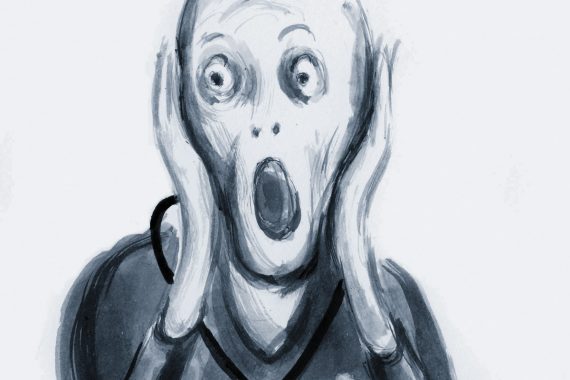Let’s get physical

The diagnostic process 2021: patient brings in printout of weird shit, insists that’s what’s wrong with him/her, big fight with GP, ultimate diagnosis: physical and psychical trauma all round, right? It’s an insult to general practice, given that it ignores the holy diagnostic trinity of history, examination and investigations – which, I think we’d agree, is still sacrosanct. Except, somewhere along the line, the ‘examination’ has been unceremoniously dumped.
True, I’ve never been a great fan of the physical examination. I’ve always argued that the history does the diagnostic heavy lifting, and the heavy lifting required to peel my arse from consulting chair to examination couch is too much effort, particularly given that the hands-on stuff is largely ritualistic placatory bollocks.
Plus, the personal hygiene of some patients – forcing me to use triple PPE and approach them as I would a radioactive isotope – is a powerful disincentive to getting up close and personal. But I do fear the pendulum is swinging too far the other way. These days, just about every aspect of modern medicine shoves the good old physical examination closer to the clinical obsolescence bin.
For starters, we’re still doing much of our consulting by remote – which immediately raises the threshold for any hands-on work.
Simultaneously, the profession seems to be having a crisis of physical examination confidence – perhaps through falling out of the habit, or deskilling, or a genuine belief that we may as well Go Directly To Scan: after all, ordering one is just a mouse click away.
And that’s what the punters want, isn’t it? We’ve all received complaints for failing to investigate, of course. But, ‘I wish to complain about Dr Copperfield for sending me for an unnecessary MRI’? Said no one. Ever.
But hang on. Skipping the examination really does drive a coach and horses through traditional medicine. There are good reasons why it has survived until now and we should think twice before completely trashing it.
Doing so will inevitably lead to overinvestigation, and you don’t need to be the duty doctor weeping over lab reports at 8.45pm to know this leads to over-medicalisation of patients and demoralisation of GPs.
Besides, we are missing a trick here. Specifically, the one we play on patients through the laying on of hands. We all know this is largely placebo but so what? If the pandemic has taught us one thing, it’s how we’ve underestimated the power of in-person consulting in general, and the value of touch in particular.
Now, you might well argue that the phrase, ‘the value of touch’ has no place in a Copperfield column unless it’s about punching a heartsink in the face. Yet it’s true: the physical exam has benefits in terms of therapy and trust way beyond the effort expended. The proof? All those musculoskeletal patients currently bending your ear because their appointment for physio – the most hands-on of all specialties – has degenerated into texted exercise sheets.
So I vote to save the physical exam. As long as they take a shower first.
Dr Tony Copperfield is a GP in Essex. Read more of Copperfield’s blogs at http://www.pulsetoday.co.uk/views/copperfield
Pulse July survey
Take our July 2025 survey to potentially win £1.000 worth of tokens

Related Articles
READERS' COMMENTS [8]
Please note, only GPs are permitted to add comments to articles














Hooray for blood test tube shortage——–now I don’t have to plough through hundreds of normal results
Grand. Think most of you are GPSIs in the tired, bloated, anxious, gluten-free, sick-note-seeking, WFH back ache, armpit follicle, runners knee and possibly diabetic or thyroid or low iron supposed hypochondriac patient. No wonder there are no yellow bottles. Filing normal calprotectins and TSH levels must be mind-numbing. I hope the stool pots are well in stock. Then explaining what else “it” could be. It? What’s “it”? Boredom? I doubt a placebo hand near the spleen or liver will stop that pointless referral to gastroenterology or endocrine. But, one could assess that vitamin D consultation with a palpation of electromagnetic warmth and Piz Buin fake tan. But, here’s a PhD and free solution for the next FRCGP – if you had to examine patients on Fridays and Saturdays between 6pm-10pm, what % would DNA? Be probably met with a regurgitation of “you didn’t text me to remind me”. And, “I’ll be on holiday then”.
@patrufini Duffy – always booked my out of hours slots for the united/city derby days because for some weird reason no one got urgently ill those days?
Physical exam has never been high on the priority list for allotting mental bandwidth to in primary care hence the notion it is largely a gesture; this is so far from the truth and would become apparent to anybody who has passed the clinical component of MRCP where patients, not actors, are used.
Also be wary of assuming a normal TSH is actually normal- for that patient. Several times have I seen that happen when the patients TSH is in the normal range but should actually be suppressed because of a history of thyroid cancer. Stuff is context dependant, something which MRCGP does not seem to feel the need to raise its game towards recognising.
Readers should look up some vids of clinical examination from the 1950s- the conclusions one can potentially reach from doing it right are astounding. Jugular Venous Pressure being a case in point.
Remember those odd neurological signs we had to elicit———now it’s straight to a brain scan
Recognising heart valve anomalies just by physical examination and listening to murmurs with a stethoscope – no echo. To be fair, in 1970-80s Birmingham rheumatic heart disease was rife, as was finger clubbing – hardly ever see it now.
I’ve seen the most normal armpits, ear wax and necks in this pandemic. Must be another hypochondriac editor’s article in Cosmopolitan or the Daily Smell.